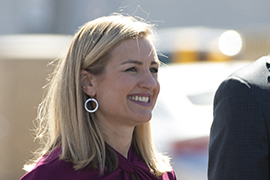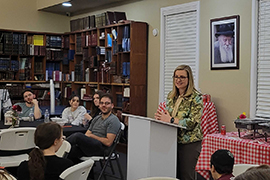- Slug: BC-CNS-Gallego Chabad,940.
- 2 photos available (thumbnails, captions below)
By Jeremy Yurow
Cronkite News
TEMPE – As one of the youngest big city mayors in the country and a member of the Jewish faith, Kate Gallego often speaks about tolerance and inclusion.
She was elected to the Phoenix City Council in 2013 at age 32 and won a runoff mayoral election in 2019, becoming the first woman elected to the office in more than three decades.
But, as she told members of Chabad at Arizona State University last month, being mayor of the nation’s fifth-largest city is no protection against the growing threat of antisemitism.
She talked about her own experience when she was advocating for surface parking lots in downtown Phoenix, a plan she said someone attacked as a “Jewish conspiracy.”
“Once I got into the office, it started happening more and more often. And sometimes people just didn’t like the decision I was making,” she said. “Throughout my time in public life, when people disagree with decisions, often they will go to sort of antisemitic tropes, which has been frustrating.”
Chabad at ASU is a social and religious club that hosts events, Jewish holidays and Shabbat dinners for students at the university. The group also offers a program for students to explore the fundamental principles of the Jewish faith.
While she spoke about the dangers of antisemitism, Gallego’s message of tolerance remained clear. She stressed that she advocates for inclusion of all groups and wants to be sure that she doesn’t “just represent the Jewish community.”
She said people with other religious affiliations also have faced prejudice in Phoenix.
“We have a very robust Sikh community that has experienced a lot of discrimination. And so when I was sworn in as mayor, I chose a Sikh young man to say the Pledge of Allegiance at my swearing in,” she said. “I have been very much welcomed by several Muslim communities, which I thought has been wonderful.”
Phoenix is a city where people come from all over the world, Gallego said.
“Right now, 70% of adults were not born in Phoenix. “We’re literally the fastest-growing city, so we added more people than any other city in the United States.”
Gallego said that while she believes Phoenix has generally done well in being a melting pot for people of different backgrounds, “it’s really been during the past four or five years where we’ve seen a larger surge in antisemitic incidents.”
While Gallego lamented that antisemitic activity on social media tends to be getting “more and more common,” she praised the passage of HB 2241. The 2021 law requires that Arizona students be taught about the Holocaust and other genocides at least twice between seventh and 12th grades.
She was asked what she considered “a big positive change” in Arizona to combat antisemitism. Gallego referenced the Arizona Jewish Historical Society’s $15 million, 17,000-square-foot museum dedicated to Holocaust education that is being built in Phoenix.
The museum will include artwork by Scottsdale artist Robert Sutz, who has chronicled local Holocaust survivors since 2000. Visitors will be able to have a hologram-like experience with local Holocaust survivor Oskar Knoblauch, who is 97. The interactive technology will allow students to ask Knoblauch’s image questions about his experiences.
“One thing that was very inspiring was we had a huge diverse community that was very supportive of us, investing in the Jewish Historical Society and building a memorial museum around the Holocaust issues of the moment,” Gallego said. “We are the largest city in the country without one and we have a really vibrant, vibrant support and not just from the Jewish community but from people interested in civil rights, who felt like understanding Jewish history is fundamental to understanding how people need to treat each other and why it’s important to speak up.”
In a 2021 interview with Arizona Jewish Life, Gallego said she speaks as often as she can about tolerance. Gallego celebrated her bat mitzvah as a young woman when she lived in Albuquerque, New Mexico, with her parents. She has said that her Jewish values are important to her and that she believes that every Jew has a role in making the world a better place.
Avin Kreisler, 23, student president of Chabad at ASU, said he was encouraged by Gallego’s comments.
“Everyone’s posting antisemitic tropes (on social media) that they don’t even understand, and it seems that everyone’s against you,” Kreisler said. “But to have someone who is (a Jewish) mayor who is elected by popularity shows that’s not necessarily the truth.”
Alexander Walter, 20, a member of Chabad at ASU who organized the event, said the group often invites elected officials to speak at its meetings. Previous guests have been Tempe Mayor Corey Woods and U.S. Rep. Greg Stanton, D-Phoenix.
Walter said Gallego was the right person to speak at a consequential time.
“It was very impactful for her to come here and speak to students directly so that they could talk to somebody who has a lot of similar experiences as them as Jewish students at ASU,” Walter said. “And obviously, with the increasing incidents of antisemitism on college campuses and around the country, I thought she was the right person for that moment.”
Rabbi Shmuel Tiechtel, 44, executive director of Chabad at ASU, said it’s important for members of the group, of all political beliefs, to have frequent dialogue with community leaders.
“There are students of all political persuasions here. We’re a religious Jewish organization. And we’re not here about specifically supporting any political side,” Tiechtel said. “But I do want leaders in the community, and among them politicians who make an impact, come and share from all sides of the political aisle.”
For more stories from Cronkite News, visit cronkitenews.azpbs.org.
^__=
Phoenix Mayor Kate Gallego says being mayor of the nation’s fifth-largest city is no protection against the growing threat of antisemitism. (File photo by Sophie Oppfelt/Cronkite News)
Phoenix Mayor Kate Gallego speaks to members of social and religious club Chabad at Arizona State University Feb. 21, 2023, in Tempe. (Photo by Shira Tanzer/Cronkite News)

